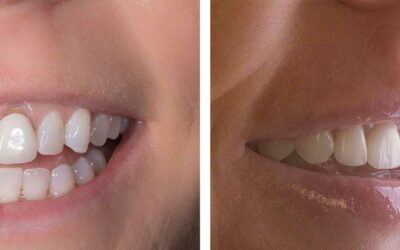Gum Overgrowth and the Causes Behind Gums Growing Over Teeth
At The Center for Advanced Periodontal & Implant Therapy in Los Angeles, CA, we know how difficult it can be to deal with gum overgrowth. Gum overgrowth, or gingival hyperplasia, is when the gum tissue around the teeth becomes unusually thick or enlarged.
It’s more than just an aesthetic concern; if left untreated, it can lead to serious dental issues. It can be caused by factors ranging from genetic predisposition to certain medications. In this article, we will investigate the causes and potential treatments for gum overgrowth so that you have a comprehensive understanding of this dental concern.
Understanding Gum Overgrowth
Gum overgrowth, scientifically known as gingival hyperplasia, is a condition where the gums swell and begin to grow over the teeth. Because of an abnormal increase in the number of gum cells, an overgrowth of gum tissue occurs. It can be caused by factors such as certain medications, hormonal changes, or poor oral hygiene.
Gum overgrowth can result in discomfort and make it challenging to eat or speak properly. The excess gum tissue can also make it harder to maintain oral hygiene, increasing the risk of dental issues such as gum disease and tooth decay. From an aesthetic perspective, gum overgrowth can affect the appearance of a person’s smile and cause self-consciousness.
It is important for patients experiencing gum overgrowth to seek professional dental care to manage the condition and prevent further complications.
What Causes Gum Overgrowth?
There are several reasons why gums may start growing over teeth. Let’s explore five primary causes.
Inflammation
Inflammation of the gums, or gingivitis, is often caused by poor dental hygiene practices such as infrequent brushing and frequent flossing. When plaque and bacteria accumulate along the gumline, it triggers an immune response, leading to gum inflammation. If left untreated, this inflammation can progress to periodontitis, a more severe form of gum disease that can result in gum overgrowth.
Regular and thorough brushing and flossing are critical in preventing gum inflammation and overgrowth. By diligently removing plaque and bacteria from the teeth and gums, you can significantly reduce the risk of developing gum-related issues.
Medication Side Effects
In discussing the causes of gum overgrowth, it’s important to note that certain medications can be a contributing factor. This type of gum overgrowth, often a side effect of medications like anti-seizure drugs, immunosuppressants, and certain heart medications, is a topic explored in-depth in this StatPearls article on the NCBI Bookshelf. Patients experiencing such symptoms should consult their healthcare provider for potential adjustments to their medication.
If you are taking any of these medications and notice gum overgrowth or changes in your oral health, it is crucial to consult with your healthcare provider. They may recommend adjusting your medication dosage or switching to an alternative medication to mitigate the gum overgrowth.
Genetic Factors
While rare, there is a genetic condition called gingival fibromatosis that can cause excessive growth of the gums. This condition is usually evident from a young age and can result in the gums covering the teeth entirely. Managing gingival fibromatosis typically requires specialized dental interventions and ongoing monitoring to prevent complications and ensure oral health.
Hormonal Imbalances and Pregnancy
Hormonal changes, particularly during pregnancy, can significantly impact gum health. The increased levels of hormones can make the gums more susceptible to inflammation. This hormonal imbalance can result in gum overgrowth, known as pregnancy gingivitis. The complexity of gingival enlargement during pregnancy, including various hormonal and physiological factors, is thoroughly examined in the British Dental Journal’s article.
Maintaining good oral hygiene during pregnancy prevents gum overgrowth and other oral health issues. Additionally, seeking regular dental care and cleanings during pregnancy can help manage any gum-related concerns and ensure a healthy oral environment for both the mother and the developing baby.
Underlying Health Conditions
Certain health conditions, including leukemia and other forms of cancer, can cause gum overgrowth. This symptom is often a result of the body’s response to these diseases.
Symptoms of Gum Overgrowth
Gingival hyperplasia, a condition characterized by an abnormal increase in gum size, presents several noticeable signs. When affected, the gums may appear visibly swollen, tender to the touch, and may even bleed easily. The condition can sometimes progress to gingival fibromatosis, wherein the excess gum tissue grows to the extent it covers the teeth.
Managing and Treating Gum Overgrowth
Treatment for gum overgrowth can vary depending on the underlying cause. Improving oral hygiene practices such as this can be beneficial if the overgrowth results from inflammation caused by plaque and bacteria.
In cases where drug-induced gingival overgrowth is the culprit, healthcare providers may consider adjusting the patient’s medication regimen to alleviate the condition. However, surgical procedures like gingivectomy or gingivoplasty might be necessary in more severe cases of overgrowth or when the condition is causing significant discomfort or functional issues.
These surgical interventions involve removing excess gum tissue and reshaping the gum line to restore optimal oral health and aesthetics. Chronic inflammatory gingival enlargement, including its causes and effective management strategies are elaborately discussed in an NCBI review. It is important to consult with a dental professional to determine the most appropriate treatment plan based on each patient’s specific circumstances and needs.
The Role of Your Periodontist in Los Angeles
Consulting with a periodontist, such as The Center for Advanced Periodontal & Implant Therapy team in Los Angeles, CA, is crucial when dealing with gum overgrowth. We can provide expert advice, diagnose the underlying causes, and offer treatment options based on your oral health status.
Empowering Your Journey to Optimal Gum Health
Gum overgrowth is more than just a cosmetic issue; it can impact oral health and overall well-being. Understanding the causes behind this condition is the first step towards effective management and treatment. If you’re dealing with gum overgrowth, remember that you’re not alone, and The Center for Advanced Periodontal & Implant Therapy in Los Angeles, CA, is here to help. Contact us today!
You May Also Like...
Improve Your Smile With Cosmetic Gum Surgery
Cosmetic gum surgery, also called gum reshaping, is a type of cosmetic dental procedure that can improve the natural...
Non-Surgical Lip Repositioning vs. Surgical Repositioning to Fix Gummy Smiles
Does a gummy smile cause you to hide your smile from the world? Are you feeling insecure or lack confidence, hiding...
Revolutionizing Gum Disease Treatment: A Non-Surgical Approach to Healing at the Microscopic Level
Gum disease is a widespread oral health issue that affects millions of people around the world. Left untreated can...



